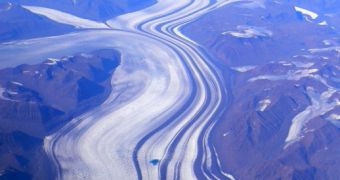There is a common belief, largely fueled by multiple studies related to climate change and global warming, that Greenland's glaciers are slipping towards the ocean at even faster rates than previously thought. A newly published paper however shows that for the last 17 years or so, Greenland's ice sheet has been actually slowing down its speeding motion towards the water, by as much as 10 percent.
Most of the previous studies mention liquid water as an important factor in the movement of the glaciers in Greenland, since it appears to act as a lubricant, thus accelerating their motion. Estimates place the water content of the glaciers in Greenland at a volume enough to raise the global sea level by 6.5 meters. In summer, molten ice forms large lakes on the surface of the glacier; part of that water eventually makes its way into the cracks throughout the ice sheet and reaches the bedrock bellow, where it behaves like a lubricant, practically doubling the rate of advance of the ice towards the ocean.
If indeed the movement of the glaciers is accelerating, then the whole situation could result in more ice coming down from higher altitudes, to melt in the warm waters of the ocean. Roderik Van De Waal of the Utrecht University however, says that this will not happen anytime soon, although his study also found that liquid water increases several times the speed at which the glaciers move.
On the other hand, Van De Waal's investigations show that the accelerations only occur for a brief period of time, after which the velocities slowly return to normal. "For some time, glaciologists believed that more meltwater equaled higher ice speeds. This would be kind of disastrous, but apparently it is not happening," said Van De Waal.
He explains that the liquid water seeping down to the base of the glacier freezes in winter, thus when summer comes water cannot drain towards the ocean, resulting in a build up of pressure just enough to lift the glacier off the bedrock. Eventually, this will result in an increase of the speed of the ice sheet, but as water flows into the ocean the pressure is released and the glacier starts settling back on the rock bellow.
This pretty much means that liquid water doesn't have such a dramatic effect as previously thought. Jay Zwally of NASA's Goddard Space Flight Center however believes otherwise, since the study made by Van De Waal averages data over a period of 17 years, while considerable melting near the ocean started relatively recently.
"It's only in the last five years or so that the warming signal has really been visible," says Zwally. He believes that about 3 to 5 percent more ice is currently being lost due to liquid water lubrication, 25 percent less than previously suggested but still enough to have a significant impact.

 14 DAY TRIAL //
14 DAY TRIAL //